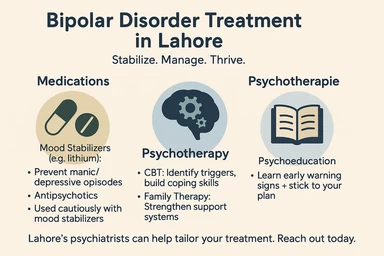Bipolar disorder is a complex and often misunderstood mental health condition that affects millions worldwide, including many in Lahore. Characterized by extreme mood swings, it can disrupt lives, strain relationships, and challenge one’s sense of self. However, with the right care, individuals with bipolar disorder can lead fulfilling lives. Lahore, with its growing network of expert psychiatrists and mental health clinics, offers hope and healing for those seeking help. This article is well researched and fact based. It explores what bipolar disorder is, how it’s diagnosed and treated in Lahore, and why ongoing care is essential for long-term well-being.
What is Bipolar Disorder?
Bipolar disorder, also known as manic depression, is a mood disorder marked by dramatic shifts in mood, energy, and behavior. These shifts, or mood swings, range from manic highs to depressive lows, often with periods of stability in between. There are three main types:
- Bipolar I Disorder: Involves severe manic episodes that may last at least a week, often requiring hospitalization. Depressive episodes are also common but not necessary for diagnosis.
- Bipolar II Disorder: Characterized by hypomanic episodes (less severe than full mania) and major depressive episodes. While less intense, hypomania can still impair daily functioning.
- Cyclothymia: A milder form with frequent mood swings between hypomania and mild depression, but not meeting the full criteria for Bipolar I or II.
During a manic episode, individuals may feel euphoric, overly energetic, or irritable, often engaging in risky behaviors like overspending or impulsive decision-making. In contrast, depressive episodes bring feelings of hopelessness, fatigue, and loss of interest in life. These extremes can be disorienting, making professional care essential.
Diagnosis of Bipolar Disorder in Lahore
Accurate diagnosis is the first step toward effective treatment. In Lahore, psychiatric clinics follow the DSM-5 (Diagnostic and Statistical Manual of Mental Disorders, 5th Edition) criteria to diagnose bipolar disorder. The process typically involves:
- Clinical Evaluation: A psychiatrist conducts a detailed interview, exploring the patient’s mood history, behavior patterns, and family background.
- Symptom Assessment: Using standardized tools, psychiatrists assess the severity and frequency of manic and depressive episodes.
- Ruling Out Other Conditions: Blood tests or medical evaluations ensure that symptoms aren’t due to thyroid issues, substance use, or other disorders.
Lahore’s top psychiatric clinics, located in areas like DHA Defence, Gulberg, Model Town, and Johar Town, are equipped with experienced mood disorder specialists who provide thorough, culturally informed assessments. Early diagnosis is crucial, as untreated bipolar disorder can worsen over time.
Treatment Options for Bipolar Disorder

Bipolar treatment in Lahore combines medication, therapy, and education to stabilize mood and prevent relapse. Here’s what’s available:
Medications
- Mood Stabilizers: Drugs like lithium and valproate are the backbone of treatment, helping to control manic and depressive episodes.
- Antipsychotics: Used to manage acute manic symptoms or when mood stabilizers alone aren’t enough.
- Antidepressants: Sometimes prescribed cautiously during depressive phases, always alongside mood stabilizers to prevent triggering mania.
Psychotherapy
- Cognitive Behavioral Therapy (CBT): Helps patients recognize and manage mood triggers, improving coping skills.
- Family Therapy: Engages loved ones in the treatment process, fostering understanding and support.
Psychoeducation
Educating patients and families about bipolar disorder is vital. Lahore’s psychiatrists emphasize the importance of recognizing early signs of mood shifts and adhering to treatment plans.
Importance of Long-Term Psychiatric Care
Bipolar disorder is a lifelong condition requiring ongoing management. Long-term psychiatric care in Lahore ensures:
- Medication Adherence: Regular follow-ups help patients stay on track with their medications, reducing the risk of relapse.
- Monitoring Mood Changes: Psychiatrists adjust treatment as needed, catching early signs of manic or depressive episodes.
- Support for Daily Functioning: Ongoing therapy helps individuals navigate work, relationships, and personal goals.
Lahore’s mental health clinics, especially in DHA, Gulberg, and Model Town, offer structured follow-up care, making it easier for patients to access consistent support.
Access to Psychiatric Care in Lahore
Lahore’s top residential areas provide excellent access to professional psychiatric care:
- DHA Defence, Gulberg, Model Town, and Johar Town: Home to reputable clinics with bipolar disorder psychiatrists who specialize in mood disorders.
- WAPDA Town, Bahria Town, Garden Town, and Shadman: For residents in these areas, online consultations make expert care accessible without the need for travel.
This local accessibility ensures that individuals can receive timely, personalized care, whether in-person or virtually.
Addressing Stigma and Cultural Considerations
In Pakistan, mental health stigma can be a barrier to seeking help. Many fear judgment or misunderstanding from family and society. However, Lahore’s psychiatrists are attuned to these challenges, offering:
- Culturally Sensitive Care: Treatment plans respect local values, involving family when appropriate.
- Confidential Support: Clinics prioritize privacy, ensuring patients feel safe discussing their struggles.
- Community Education: Efforts to reduce stigma are growing, with psychiatrists advocating for mental health awareness.
Support systems, including family and friends, play a crucial role in recovery. Lahore’s mental health professionals encourage open dialogue and education to foster understanding.